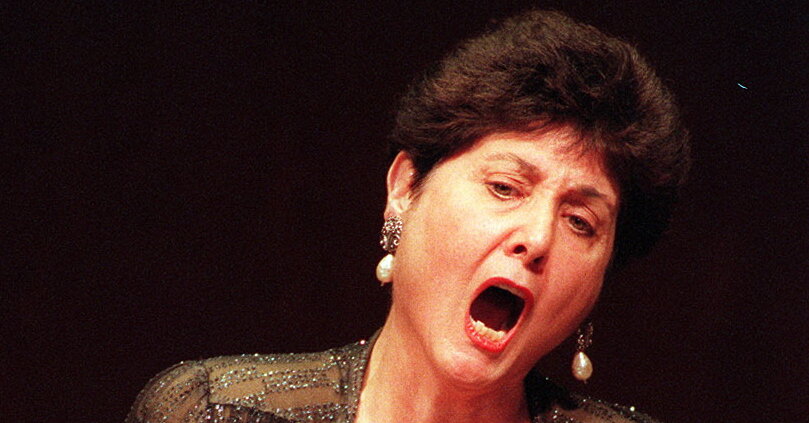Benita Valente, an American light soprano who was acclaimed for the faultless technique and intelligence of her performances in operas, recitals and chamber music, but who inexplicably failed to gain a wider following among classical music audiences, died on Friday at her home in Philadelphia. She was 91.
Her son, Pete Checchia, confirmed the death.
Whenever an aria or a song required it, Ms. Valente demonstrated exquisite control of chromatic vocal lines and an effortless mastery of her high notes, matched lower down her range by admirable freedom and control.
In opera, her voice was ideally suited for a role like Pamina in Mozart’s “The Magic Flute,” which she performed more than 200 times. Critics raved about her interpretations of cantatas by Bach. In lieder, few of her peers could match her renditions of Franz Schubert, Robert Schumann and Hugo Wolf.
“All the hallmarks of bel canto technique are hers to command — the ability to sing evenly at any part of her range, loud or soft; the skill to ascend smoothly through the various registers; a complete lack of obtrusive wobble or hoarseness,” the Chicago-based opera and classical music commentator Brian Duffie wrote in prefacing an interview with Ms. Valente in 1987. “Add to that a clear, idiomatic declamation in a variety of languages, a natural musicality of phrasing and an inherently dignified, sympathetic public personality, and you have an artist to reckon with.”
Yet despite such effusive praise from critics, Ms. Valente’s performances did not always fill auditoriums. And she made painfully few recordings.
While she often expressed satisfaction and delight at her long, varied career, she occasionally allowed a hint of bitterness to surface when asked why she recorded so seldom.
“It’s because I haven’t been asked to record,” she told The New York Times in 1983, at the height of her career. “I’ve never been in the ‘in’ crowd.”
Benita Valente was born on Oct. 19, 1934, in Delano, Calif., in the San Joaquin Valley, where her parents owned a dairy farm and grew cotton. The youngest of four daughters, she sang duets with one of her sisters, who played the piano. She listened often to the Enrico Caruso records in her father’s collection. Her mother, who was from Switzerland, sang Swiss songs.
“I could hear this beautiful high voice floating through the air from the milk house or the barn,” Ms. Valente recalled to The Times in 1983.
Chester Hayden, her music teacher at Delano High School, persuaded her that she had the voice to sing professionally. He put her on a rigorous study program for languages, piano and the basics of singing. And he drove her to Los Angeles to audition for the German soprano Lotte Lehmann, who was teaching at the Music Academy of the West in Santa Barbara. Ms. Lehmann accepted the young woman for studies there.
Ms. Valente later received a scholarship from the Curtis Institute of Music in Philadelphia, where she studied under Martial Singher, a well-known French baritone.
In 1960 she was invited to sing at the Marlboro Music Festival in Vermont, where she met her future husband, Anthony Checchia, a bassoonist who went on to become founding artistic director of the Philadelphia Chamber Music Society, the nation’s largest presenter of chamber music concerts.
Besides their son, a photographer and artist, Ms. Valente is survived by a daughter, Eliza Batlle, a psychologist. Her husband died in 2024.
After winning the Metropolitan Opera auditions in 1960, Ms. Valente made her debut with the Freiburg im Breisgau Opera as Pamina in “The Magic Flute” in 1962. She then performed frequently at the Nuremberg Opera.
She spent a dozen years in Europe waiting for invitations to perform in the United States. “I believed I would have to make it in the States or not at all,” she told The Times.
In 1973, Ms. Valente, then 38 years old, finally made her debut at the Metropolitan Opera, as Pamina.
“From the moment she came onstage,” Allen Hughes of The Times wrote in a review of that performance, “Miss Valente, the Pamina, sounded as though it was the most natural thing in the world for her to be there. Her beautifully poised voice projected admirably, and the sensitivity and authority of her style commanded instant and sustained attention.”
Ms. Valente went on to perform a full schedule of operas, recitals and oratorios for decades. But music critics and many operaphiles were mystified that her popular following remained limited.
In a glowing 1983 review of a recital of songs by Haydn, Brahms and Wolf, the Times music critic John Rockwell lamented that Ms. Valente failed to sell out Alice Tully Hall. “The curiosity,” he wrote, “lies in the discrepancy between her prodigious gifts and her relative lack of renown.”
Similarly, in his review of a sterling recital of Schubert, Haydn and Wolf songs at the Metropolitan Museum of Art in 1985, The Times’s Bernard Holland wondered why “she remains far less known than many colleagues of smaller ability.”
Taking a stab at the mystery, Mr. Holland suggested that the answer might “lie in the peculiar nature of Valente’s musical personality — whose purity does not reach out aggressively but instead invites the attentive and the caring among her listeners to draw closer.” Such purity, he added, also “makes up for any lack of sensuous tone.”
Ms. Valente devoted herself equally to opera and song. Besides her many appearances in “The Magic Flute,” she was applauded for her performances as Gilda in Verdi’s “Rigoletto,” Violetta in Verdi’s “La Traviata” and Mimi in Puccini’s “La Bohème.”
She also made a notable mark as a chamber music performer, with a repertoire that spanned from Baroque cantatas to modern compositions. Among contemporary composers, she enjoyed close relationships with William Bolcom, who wrote several works for her, and with John Harbison, who set poems by William Carlos Williams to music texts that Ms. Valente performed in recital.
In a review of a Valente recital at the Juilliard Theater in 1999, The Times’s chief music critic, Anthony Tommasini, extolled her undiminished ability to sing Mr. Harbison’s highly charged “The Rewaking.”
“The music captures the stormy weather of the poetic imagery in tormented vocal lines,” he wrote, “but it renders the calm after the storm in melodic arcs of high, soft, sustained beauty, and Ms. Valente handled it all impressively.”
Summing up her career to The Times when she was approaching 50, Ms. Valente said, “It’s been a long, slow, wonderful crescendo.”
The post Benita Valente, Acclaimed Bel Canto Soprano, Is Dead at 91 appeared first on New York Times.




